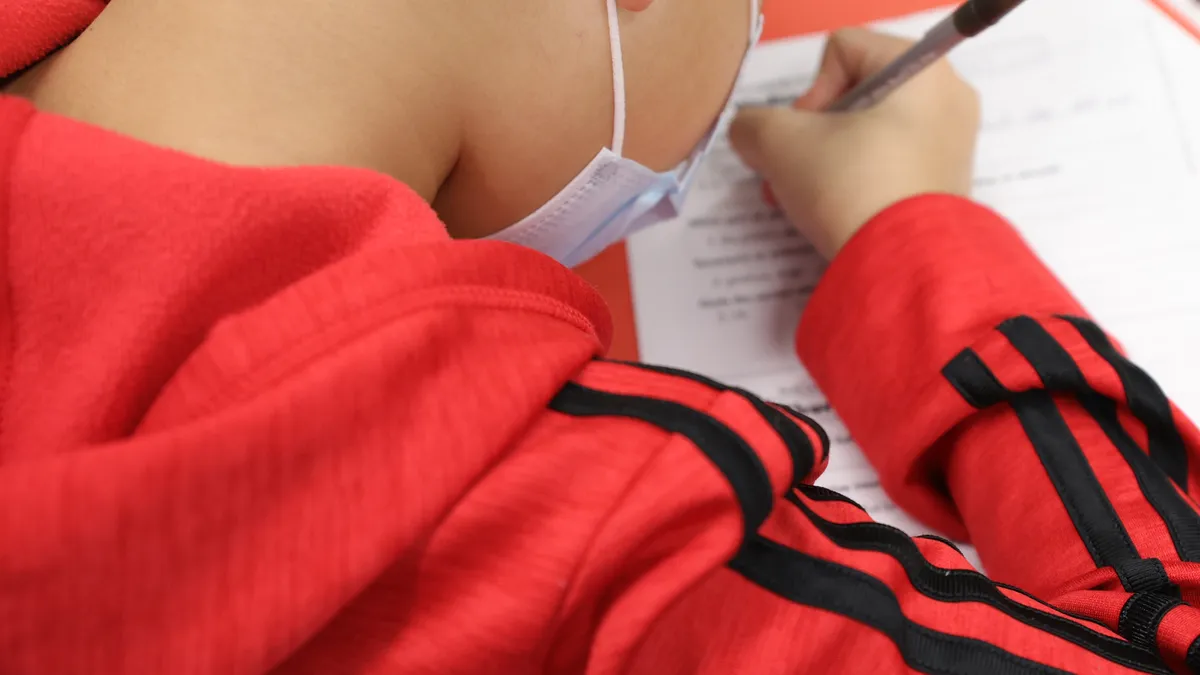Dive Brief:
- Educators across the country are struggling to keep students with disabilities on track academically as the omicron variant of COVID-19 moves aggressively through communities, forcing some schools to switch temporarily to remote learning.
- Although school systems in general aren't seeing the same levels of disruption to learning as in the pandemic's early months, the rise of COVID-19 variants and their impact on safety protocols are causing special educators to balance personal safety with their desire to teach in person, said Phyllis Wolfram, executive director of the Council of Administrators of Special Education, a nonprofit whose members include local special education professionals.
- Staff shortages predominant in special education before the public health crisis, in addition to pressures to stay compliant with the Individuals with Disabilities Education Act, are leading special education departments to be creative in providing individualized supports for students in both remote and face-to-face settings — and to prioritize parent communications, Wolfram said.
Dive Insight:
Research has highlighted the pandemic's disproportionate impact on students with disabilities, and federal, state and local school offices have promoted efforts to improve and expand supports for students.
Still, no one wanted more school closures nearly two years into the pandemic. "I think what schools are struggling with right now … is well, if we go back to virtual, what do we do with kids with disabilities?" said Mitchell Yell, the Fred and Francis Lester Palmetto Chair in Teacher Education at the University of South Carolina.
Yell, who is also on the board of directors for the Council for Exceptional Children, said special educators must continue to ensure all services and instructional supports in a student's individualized education program are received and that teachers and administrators monitor progress toward students' unique goals.
Early in the pandemic, CASE and the National Association of State Directors of Special Education requested flexibilities in some IDEA timelines for IEP reviews and complaints. But Congress declined any delays. This led some school districts to become noncompliant and adhere to corrective action plans as they worked through a backlog of IEP evaluations and reviews.
There also have been several state complaints filed against school systems for failing to implement students' IEPs during closures, according to a list compiled by The Advocacy Institute, a nonprofit that works to improve the lives of people with disabilities.
School administrators are struggling to respond to both parents who want a virtual learning option for children with underlying health concerns and those who insist that in-person learning continue for students with disabilities despite increases in COVID-19 positive cases. Lawsuits filed last week in New Jersey and Michigan seek to block schools from closing for students with disabilities.
An analysis conducted by The Center for Appropriate Dispute Resolution in Special Education showed while written state complaints declined slightly from 2018-19, the last non-pandemic school year, to 2019-20, due process complaints rose from 21,338 in 2018-19 to 22,359 in 2019-20.
Wolfram and Yell said some special education programs are still playing catch-up with evaluations, IEP reviews and services, but they are working diligently to meet students' needs through conversations with families who are part of the IEP team.
"You have to understand your obligations, and you, creatively with a student's parents, determine how best you can meet those obligations," Yell said.
Continued experience in supporting students with disabilities during the pandemic has led to some effective practices, such as virtual IEP meetings that help more parents participate in educational decisions for their children and the use of ed tech to supplement in-person instruction and services, special educators said.
The ed tech companies supporting students with disabilities have been receptive to input from parents and educators, Wolfram said.
Wolfram said CASE is also working to support educators' mental health. It is hosting educator self-care and adult social-emotional learning sessions during its virtual winter workshop and has been hosting webinars for special educators on navigating the COVID-19 crisis.
"We know that not only has the mental health of our families and our students been impacted by shutdowns and school closures and virtual learning, that our teachers have been too, and the stress sometimes weighs heavily on all of us," Wolfram said.










